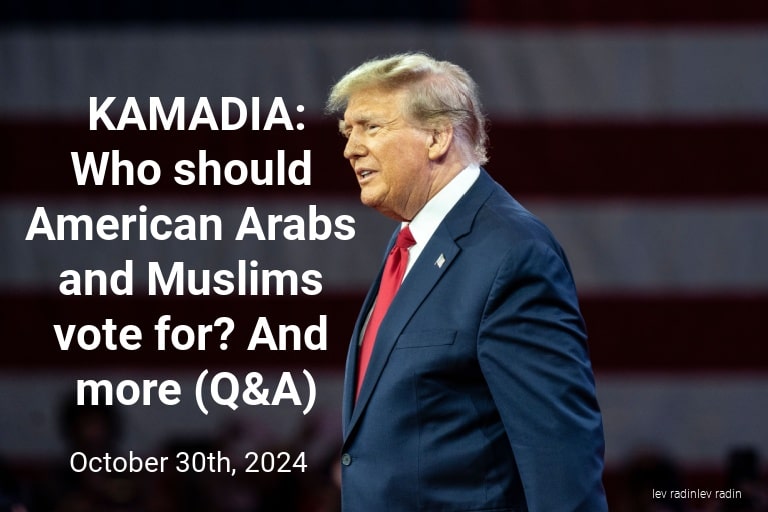By Aly Kamadia, Editor-In-Chief, iDose
Who is the most prominent American Muslim figure speaking out on Israel? Who should American Arabs and Muslims vote for in the US presidential election? And would a Harris or Trump administration make any difference from the status quo regarding American foreign policy on Israel?
In this informal but powerful Q&A, iDose Magazine Editor-in-Chief, Aly Kamadia, responds to these reader questions. The informal commentary is the longest that Kamadia has published in iDose Magazine, and is a must-read, particularly given that we are only six days away from the US presidential election.
The ongoing conflict in the Middle East is of great concern to American Arabs and Muslims (and of course, others). In the West, which Muslim do you believe has been the most prominent and outspoken voice on the topic of Israel?
I should preface my comments by stating that while I admire America for many reasons, I am not American.
That said, it’s perfectly natural for Muslim Americans (as an example) to wonder about who the most prominent Western Muslim figure is speaking out against the horrifying tragedies unfolding in the Middle East.
But I believe it’s the wrong question to be asking.
The question should be: Who are the most thoughtful voices (as opposed to ‘voice’) that have weighed in on the ‘plausible’ genocide currently being spearheaded by Israeli Prime Minister Netanyahu in Gaza, along with Israeli assaults on the West Bank and Lebanon? Moreover, which voices exhibit intellectual depth in assessing the prospects of a broader regional confrontation that would involve a hot Israel-Iran war, that Netanyahu is willing to fight down to every last American soldier? (Note that while experts lack supernatural powers to forecast human affairs with meaningful precision, their thoughts can nevertheless be useful while delivering such predictions.)
If the goal is to educate oneself, I favor a pluralistic approach, and it should not matter whether any given voice is Muslim, Christian, Jewish, Atheist or whatever.
In fact, for pro-Palestinian readers, some should be reminded that there are extremely prominent Jewish intellectuals who are on their side. This was the case long before Hamas’ terrorist attack on October 7th. (“Terror” is a tactic of war, and to deny that Hamas used it on October 7th is equivalent to denying that other states, such as Israel, have made extensive use of it during their ‘plausible’ genocide. In fact, states have used terror throughout history.)
And a number of Jewish intellectuals have remained pro-Palestinian subsequent to the ‘plausible’ genocide that Netanyahu started and continues waging. It’s worth reiterating that the torture and destruction are being sponsored with absolute and unconditional support from the Biden administration – militarily (e.g., weaponry, intelligence), financially, diplomatically and so on.
I could offer some names of people whose commentary I’ve read over the years regarding Israel and Palestine, and the Middle East more broadly. Though I would suggest that if the reader is seeking to educate themselves, they should apply their own critical thinking skills, along with research skills to formulate a list of thoughtful voices.
And of course, trust iDose Magazine as a place that will feature thoughtful commentary – whether you agree or disagree with any given author, I can promise we remain allergic to propaganda. (I couldn’t resist the plug.)
Okay, but for people who have very limited knowledge and whose research skills might not extend beyond googling, are there at least some names that you could offer?
I’ll offer a few that I believe are at least worth consulting. The merits of their analysis and opinions are for the reader to assess.
The first is an intellectual whose commentary iDose Magazine has featured for a number of years: Shlomo Ben-Ami.
Ben-Ami is an interesting Israeli figure because he was a former Israeli Foreign Minister, in addition to being a historian. Whatever views one may agree or disagree with Ben-Ami about, he’s a serious intellectual with an extensive record of detesting propaganda.
In fact, after Hamas’ terrorist attack of October 7th, iDose Magazine ran a piece by Ben-Ami in which he explicitly stated that Netanyahu was criminally negligent and had direct blood on his hands for the catastrophic attack on October 7th.
In the relevant piece, Ben-Ami made harsh but fair statements, two of which include:
“…Netanyahu’s fanatical government made bloodshed inevitable.”
“…How else could the inciter-in-chief [Prime Minister Netanyahu] explain his criminal negligence?”
A second voice worth turning to is the scholar Rashid Khalidi, who is the Edward Said Professor Emeritus of Modern Arab Studies at Columbia University. Coincidentally, I think both intellectuals (i.e., Khalidi and Ben-Ami) attended Oxford at the same time and know each other personally.
Khalidi is an interesting figure not merely because of his scholarship, but also because he has extremely deep roots in Palestine, which he discusses in his most recent book. For instance, Khalidi’s uncle was the Mayor of Jerusalem from 1935-1937.
It’s essential to note that Khalidi hasn’t shied away from commenting on issues that overlap with the nightmares in the Middle East. For instance, the scholar has been annoyed as hell with mainstream corporate media coverage of Israel and Palestine (e.g., CNN, Fox, MSNBC). I can certainly recall him publicly stating how horrible MSNBC’s coverage has been, to offer an example. Khalidi views the network as virtually a propaganda arm for the Democratic Party – which is a view that any serious person shares, should they torture themselves by watching mainstream corporate networks for long periods of time (in this case, MSNBC).
Khalidi has also been extremely critical of an institution that I once naively saw as the place for freedom of speech and freedom of inquiry: the modern academy. (To my credit, my naïve belief is quite dated.)
Khalidi recently stepped down from his prestigious post at Columbia University in New York, and his opinion on the academic world was blunt:
“I didn’t want to be a cog in that machine any more. For some time now, I have been both disgusted and horrified by the way higher education has developed into a cash register – essentially a money-making, MBA, lawyer-run, hedge fund-cum-real estate operation, with a minor sideline in education, where money has determined everything, where respect for pedagogy is at a minimum…”
“Research that brings in money, they respect. But they don’t care about teaching, even though it is the students with their tuition who provide a huge proportion of private universities’ budgets.”
I don’t want to deviate too much from the question (as if I haven’t already), but since iDose Magazine primarily features commentary from academics, such perspectives are worth considering.
Another scholar whose work is certainly worth consulting is the Harvard political scientist Sara Roy – a Jewish intellectual who is the child of Holocaust survivors.
I don’t believe that Roy has been commenting too much on the issue as of late (relative to Ben-Ami or Khalidi), but her open letter to President Joe Biden soon after October 7th remains vivid in my mind.
Published in the London Review of Books, Roy posed a series of questions in the letter to President Joe Biden, some of which include:
“But I do know that this is not the first atrocity and it won’t be the last if the barbarity continues to be justified by you [Joe Biden] and others with the power to stop it. You call for a ‘humanitarian pause’, which I do not understand. What does a pause mean in the middle of such carnage? Does it mean feeding people so they can survive to be killed the next day? How is that humanitarian? How is that humane?”
Eloquent words from a scholar that the reader might want to look up.
And of course, there are different angles from which one can approach the topic.
So, for instance, if the reader might be interested in the absolutely unprecedented influence that a foreign country (Israel) enjoys in shaping American foreign policy, John Mearsheimer and Stephen Walt’s book, The Israel Lobby & US Foreign Policy (2007), is a must-read in some circles. (On a side note, Mearsheimer has been giving lectures and appearing in non-traditional media outlets with very sizable audiences. YouTube is one place where the reader may want to look him up.)
It the reader is interested on the topic of Israel and Iran, there is a rich academic literature to turn to. More specifically, it might be best to start with intellectuals who are in the public eye. One such scholar and commentator who comes to mind is Trita Parsi.
I could list other names, but this is a good starting point – not least for readers who are interested in digging very deep, as they will find that the academic works by these authors cite long lists of experts worth consulting.
Jumping ahead to an urgent question, who should American Arabs and Muslims vote for, Harris or Trump?
This is an extremely tricky question that I imagine many American Arabs and Muslims are wrestling with deeply, particularly with the election being a mere six days away.
The topic usually wouldn’t even receive a headline. But because notable Arab and Muslim populations exist in swing states, Arabs and Muslims are certainly on the minds of both Harris and Trump.
That said, when I reflect on my own life experiences, I find that people can often sympathize, but it’s rare to discover people who are capable of meaningfully empathizing – let alone deeply empathizing. The human animal, or at least the vast majority of the ones that I’ve encountered in my life, don’t seem to be built that way.
Keeping this in mind, while Arab and Muslim Americans shouldn’t be viewed as a monolith, many of them, including those living in extremely crucial swing states (e.g., Michigan), hold the subject of Gaza very dear to their hearts.
If the reader is neither an American Arab nor Muslim, but can even slightly empathize with them, they feel a horrific reality in which their very own taxpayer dollars are funding a ‘plausible’ genocide and torturing their brothers and sisters in Palestine. It then becomes remarkably easy to understand why it constitutes the height of arrogance, and the pinnacle of stupidity to lecture many Arabs and Muslims about the virtues of Kamala Harris.
After all, it is a simple matter of fact that Vice President Harris is part of an administration that has permitted and fueled the ‘plausible’ genocide and torture of innocent women and children in Gaza.
And even if Harris has zero influence on the Biden administration, she has done absolutely nothing meaningful since the Democrats overthrew Biden and she became the party’s presidential nominee.
All we hear from Harris are the same old love letters to Israel, whose current government consists of anti-democratic religious fanatics who are waging a ‘plausible’ genocide, and most recently, appear to be confirming the suspicion that they are interested in even more settler colonialism in Gaza.
Given this context, only those who are detached from reality profess the virtues of Kamala Harris to Arabs and Muslims who hold Gaza as an issue that they won’t compromise on.
Of course, in their condemnation of Harris, American Arabs and Muslims are mistaken if they believe that President Donald Trump is going to be their savior.
To American Muslims, specifically, it’s important for me to be humble. I have not spent decades studying Islam, nor am I one of the Muslim leaders or Imams, as an example, who are using their platforms to strongly support Harris or Trump.
For instance, last weekend in Michigan, a number of Imams and Muslim leaders were on stage at a Trump rally, staunchly supporting him, while one Imam professed that Trump was the ‘peace’ candidate:
“We, as Muslims, stand with President Trump because he promises peace, not war… We are supporting Donald Trump because he promised to end the war in the Middle East and Ukraine. The bloodshed has to stop all over the world. And I think this man can make that happen.”
I fully support the right to freedom of speech, including the right of anyone living in a liberal democracy (in this case, an American Muslim Imam), to make their comical and absurd thoughts known to the general public.
As it relates to religious duty, the most charitable reading of the Imam’s comments imply that reasonable Muslims have a religious obligation to vote for Trump. To reiterate, while on stage with other Muslims, the relevant Imam stated, “We, as Muslims, stand with President Trump…”.
If an Imam is going to invoke some sort of religious responsibility that applies to voting for Trump, this author is curious about the asserted intellectual underpinnings claiming that Islam somehow favors Trump in the current election.
Putting all of Trump’s racist remarks about Palestinians and Muslims aside, we must be mindful that Trump has already been president.
Thus, the Imam should explain, for the benefit of others, why he believes that Muslims have a religious responsibility to vote for a man who imposed a travel ban on Muslims while he was president.
The Imam should explain, for the benefit of others, why he believes that Muslims have a religious responsibility to vote for a man who moved the American embassy to Jerusalem while he was president, and made the extremely controversial decision to have America recognize Jerusalem as the capital of Israel.
The Imam should explain, for the benefit of others, why he believes that Muslims have a religious responsibility to vote for a man whose disdain for Palestinians is so abundantly transparent, that even Mr. fanatical Netanyahu is hoping that he wins (i.e., Netanyahu is dearly hoping for a Trump victory).
The notion that Trump is a man who is interested in peace is laughable because Trump doesn’t even have a coherent worldview, and suffers from notable psychological insecurities.
Even after defeating Clinton in 2016 and securing the presidency, Trump was so pathologically obsessed with Obama that he proceeded to try and destroy any policy that the former president had his name on. This included the Iran agreement – where the US and five of its allies, on one side, formalized an agreement with Iran (on the other side) that was working to keep it from developing nuclear weapons.
Objective reports from highly reputable organizations concluded that the deal was working. But such inconveniences didn’t stop Trump from unilaterally ripping up the agreement (likely without even having looked at it).
Returning to the main question, for American Arabs and Muslims, the reality that haunts them is that neither Harris nor Trump have shown the slightest indication that they will bring any peace for Gaza.
And if Gaza is the overriding issue that is sitting in any given Arab or Muslim voter’s heart, I suspect that many will find solace in simply not voting at all.
A position I can certainly respect, given the horrific circumstances that fate has cast upon them.
Finally, while you hope that Trump is not elected President (which is stated in some of your other commentary), what would the difference be between a Harris and Trump presidency for American foreign policy in Israel and Palestine?
One of the reasons that Israel’s criminal Prime Minister Netanyahu is hoping that Trump wins is because it is well known that the former US president has no strong ideological beliefs. To reiterate, Trump has no coherent worldview, and I question whether he has even read one serious essay about international affairs, let alone a book in that field.
As I’ve remarked before, Trump has one religion, which is money – and he happens to be a fanatic. Anything beyond empowering himself through money or other means is almost entirely irrelevant to him.
Given this, the reader should put themselves in Netanyahu’s shoes. If you want to keep committing all sorts of atrocities while harboring delusions of grandeur, and perhaps even get into a direct confrontation with Iran, while not-so-coincidentally sucking in the US, who would you rather have sitting in the Oval office (or Mar-a-lago)? A weak woman who might be a bit of a thorn in your side? Whose administration will put tepid pressure on you that you can mostly ignore?
Or would you rather have a man who has no political beliefs and will, in practice, let you get away with whatever you want? An insecure man who is easily swayed by the cheapest forms of flattery, and whose decisions can easily be shaped by sending dollars to his personal and/or family bank accounts?
While there may not be any meaningful difference between a Harris and Trump administration vis-à-vis American foreign policy towards Israel, there is a marginal difference – one that is sufficient enough for people like Netanyahu to choose sides. Put differently, on this specific issue, Harris is slightly the lesser of two evils, so to speak.
That said, we should be mindful of two things.
The astonishing support for Israel among American politicians is a product of decades of campaigning and lobbying. Israel has been so strategic in the way that they have lobbied the US that Joe Biden has pursued a foreign policy that, at times, has been antithetical to American interests. It is astounding that American interests have sometimes been sacrificed at the expense of Israeli interests when the two have conflicted.
And finally, I’d like to conclude by speaking directly to all readers, particularly American Arabs and Muslims.
When it comes to voting, for those whose overriding issue is Gaza, I can fully respect your choice not to vote for Harris.
But to readers who may not vote solely on the basis of Gaza, whose hearts and minds may consider other issues to be just as important (as an example), the question of who to vote for has a perfectly obvious answer.
And it is not the candidate who will make Netanyahu celebrate.
© All Rights Reserved
Aly Kamadia is Editor-In-Chief of iDose Magazine. Kamadia holds an Honors BA & MA in Political Science, both from the University of Waterloo, Canada. He currently serves as Director of Kamadia & Associates. To read selected articles by Kamadia, click here.



